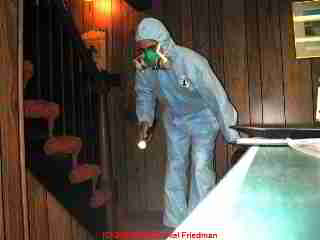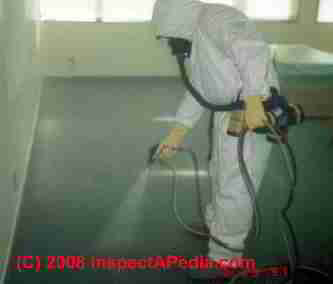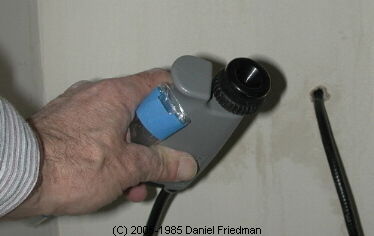 Conflicts of Interest in Building Inspection & Mold Testing
Conflicts of Interest in Building Inspection & Mold Testing
Use an Independent a Professional to Inspect or Test a Building
- POST a QUESTION or COMMENT about how to hire an expert to inspect or test a building for mold or other indoor contaminants while at the same time assuring that there are no conflicts of interest tha threaten the actual or potential quality of the work performed or the cost of the job.
How to avoid unethical conflicts of interest when hiring a consultant:
This article describes how to assure that the scope of work specified in a mold or other indoor environmental cleanup has not been tainted by the conflict of interest of a business or financial relationship between the initial consultant and the company who will perform the actual cleanup and building repairs.
While we use mold testing and inspection as an example of conflicts of interest to avoid, the same principles apply to hiring a professional for any building inspection such as for roof hail damage, fire damage, insurance settlement inspections, or other tests.
InspectAPedia tolerates no conflicts of interest. We have no relationship with advertisers, products, or services discussed at this website.
- Daniel Friedman, Publisher/Editor/Author - See WHO ARE WE?
Avoid Conflicts of Interest When Hiring Mold Inspectors or Remediation Contractors
 How to avoid conflicts of interest during a mold remediation project: the person who evaluates your property to tell you what (possibly costly) cleanup work
is needed certainly should not be the same person who is going to perform that work.
How to avoid conflicts of interest during a mold remediation project: the person who evaluates your property to tell you what (possibly costly) cleanup work
is needed certainly should not be the same person who is going to perform that work.
Is this person related to your mold inspector?
The mold "remediator" shown at left is spraying a biocide on wall-to-wall carpeting in a mold-contaminated building - a procedure whose validity may be rather questionable. But worse, if the remediator is related to the person you paid to define the scope of work, there is an innate conflict of interest involved.
In the photograph at page top the author, modeling attractive blue Tyek, ™was examining a very moldy basement.
He will find the extent of cleanup needed, perform appropriate testing in this and other building areas, and will assist the homeowner in evaluating the results of the cleaning effort.
Such "suiting up" in protective gear is not required in buildings where there is not a suspected or obvious mold hazard, and we warn that over-dressing can inappropriately scare building occupants.
In any case, regardless of how we dress, in our opinion and that of many other professional and industry experts:
It is unethical and a conflict of interest for the investigator who is going to specify what mold remediation cleanup work is needed in a building to also offer to perform the cleanup work itself.
How to Avoid a Risky Conflict of Interest When Hiring a Consultant
 Make certain that the environmental consultant, mold test consultant, mold inspector, or similar expert:
Make certain that the environmental consultant, mold test consultant, mold inspector, or similar expert:
- Has no business nor financial relationship
with any company who might be hired to perform building cleanup, remedfiation, or repair work. - Has actual education and experience
in building science, appropriate areas of environmental science, use of test instruments, and if the problem is mold-related, mycology, and mold causes, remediation, and sound test procedures.
Just hiring someone to "perform an air test" or "do a culture test" to screen your home or building for mold contamination is not likely to be reliable. - Mold certification?
We add "mold test certification" or "environmental test certification" or "industrial hygienist" to this criteria with the warning that a weekend course or two in "mold" or "mold remediation" does not make an expert any more than a PhD in mycology makes someone a competent building scientist.
Some mold, environmental and other apparentlyi professional certifications can be had for simply sending in a fee - my dog Katie was, for a time, a certified professional home inspector [- Ed.] and years ago on the West Coast of the U.S. a fellow was sued for libel after his cat became a certified building & real estate appraiser.. - Independence between mold remediator and mold clearance inspector:
similarly, after a mold cleanup has been ompleted, the person who inspects and tests to certify that the work has been done properly should have no connection with the company who performed the cleaning. This independence actually protects everyone concerned - the building owners, occupants, and the mold cleanup company as well.
Reader Comments, Questions & Answers About The Article Above
Below you will find questions and answers previously posted on this page at its page bottom reader comment box.
Reader Q&A - also see RECOMMENDED ARTICLES & FAQs
Reader Question: How do I find an "independent" mold consultant?
How does one find an independent mold consultant? - Mary Robinson
I just had my pest control company look in my attic for mice. When they came downstairs they told me there is 'wood fungus' on the attic beams. They offered to spray it to kill it for almost $800. From what I've read, this doesn't sound like a good idea. Would you suggest hiring an investigator? - D. Falk
Reply: your mold expert should investigate and write the remediation plan but should not perform the cleanup work
Mary: If your emphasis is on "independent" you need to interview the consultant and make sure that s/he only inspects, diagnoses, tests, and writes the remediation and repair plan - that is, s/he does not perform the actual cleaning or repair work, and s/he has absolutely no financial nor business relationship with the company that does perform that work.
If your emphasis is on how to find a mold or indoor air person, my goodness, we're drowning in them - by using the EXPERTS DIRECTORY link at page top you will see lists of directories of inspectors various expertises; on line web search, yellow pages, inside of matchbook covers.But unfortunately some such "experts" just collect samples and send them to a lab - not a very helpful process if a diagnostic inspection and interview and consulting are not included in the fee.
And other "mold experts" are more interested in performing the clean-up job too - an innate conflict of interest that exposes everyone, you, the consultant, the cleanup crew, to an actual or potential charge that the advice you received was not un-biased.
D. Falk: Your PCO may be well intended and certainly they have found it profitable to jump on the mold bandwagon, but their approach is incompetent. Spraying as a "cure" for mold is inadequate. Proper procedure is more work - if there is a problem mold reservoir the mold is physically cleaned (removed) and its cause has to be corrected.
See details
at CHOOSE a FLOOD DAMAGE RESTORATION or MOLD REMEDIATOR - how to find a good, competent, mold remediation or water damage remediation company. [Live link given just below]
...
Continue reading at CHOOSE a FLOOD DAMAGE RESTORATION or MOLD REMEDIATOR, or select a topic from the closely-related articles below, or see the complete ARTICLE INDEX.
Or see these
Recommended Articles
- ACCURACY OF AIR TESTS for MOLD
- CHOOSE a FLOOD DAMAGE RESTORATION or MOLD REMEDIATOR
- CONFLICTS OF INTEREST
- DEFINITION of IAQ PROBLEM
- HAIL DAMAGED SHINGLES & OTHER ROOF COVERINGS for an example of possible roof & insurance settlement inspection conflicts of interest
- INADEQUATE MOLD REMEDIATION PLAN
- MOLD ACTION GUIDE - WHAT TO DO ABOUT MOLD
- MOLD CLEARANCE: FOLLOWUP STEPS
- MOLD CLEANUP GUIDE- HOW TO GET RID OF MOLD - home
- MOLD CLEANUP - MISTAKES to AVOID
- MOLD CLEARANCE INSPECTION
- MOLD & ENVIRONMENTAL CLEANUP COMPANIES
- MOLD / ENVIRONMENTAL EXPERT, HIRE ? - how to decide when to hire an expert
- MOLD INSPECTORS & MOLD TESTERS
- OIL TANK TESTING / REMOVAL
- ROOFING MATERIALS TEST LABS
- WHEN TO STOP LOOKING FOR MOLD
Suggested citation for this web page
CONFLICTS OF INTEREST at InspectApedia.com - online encyclopedia of building & environmental inspection, testing, diagnosis, repair, & problem prevention advice.
Or see this
INDEX to RELATED ARTICLES: ARTICLE INDEX to MOLD CONTAMINATION & REMEDIATION
Or use the SEARCH BOX found below to Ask a Question or Search InspectApedia
Ask a Question or Search InspectApedia
Try the search box just below, or if you prefer, post a question or comment in the Comments box below and we will respond promptly.
Search the InspectApedia website
Note: appearance of your Comment below may be delayed: if your comment contains an image, photograph, web link, or text that looks to the software as if it might be a web link, your posting will appear after it has been approved by a moderator. Apologies for the delay.
Only one image can be added per comment but you can post as many comments, and therefore images, as you like.
You will not receive a notification when a response to your question has been posted.
Please bookmark this page to make it easy for you to check back for our response.
IF above you see "Comment Form is loading comments..." then COMMENT BOX - countable.ca / bawkbox.com IS NOT WORKING.
In any case you are welcome to send an email directly to us at InspectApedia.com at editor@inspectApedia.com
We'll reply to you directly. Please help us help you by noting, in your email, the URL of the InspectApedia page where you wanted to comment.
Citations & References
In addition to any citations in the article above, a full list is available on request.
- [2] "A Brief Guide to Mold, Moisture, and Your Home", U.S. Environmental Protection Agency US EPA - includes basic advice for building owners, occupants, and mold cleanup operations. See http://www.epa.gov/mold/moldguide.htm
- [3] US EPA - MOLD REMEDIATION in SCHOOLS & COMMERCIAL BUILDINGS - - US EPA
- [4] US EPA - UNA BREVA GUIA a MOHO / HONGO
- [5] US EPA - Mold Remediation in Schools and Commercial Building [ copy on file as /sickhouse/EPA_Mold_Remediation_in_Schools.pdf ] - US EPA
- [6] "Indoor Air Quality Problem Solving Wheel", U.S. EPA (included in [3] above. EPA Telephone for IAQ information & publications: 800-438-4318 S/N 055-000-00390-4
- Allergens: Testing for the level of exposure to animal allergens is discussed at http://www.animalhealthchannel.com/animalallergy/diagnosis.shtml (lab animal exposure study is interesting because it involves a higher exposure level in some cases
- Allergens: WebMD discusses allergy tests for humans at webmd.com/allergies/allergy-tests
- Atlas of Clinical Fungi, 2nd Ed., GS deHoog, J Guarro, J Gene, & MJ Figueras, Centraalbureau voor Schimmelcultures, Universitat Rovira I Virgili, 2000, ISBN 90-70351-43-9
- "IgG Food Allergy Testing by ELISA/EIA, What do they really tell us?" Sheryl B. Miller, MT (ASCP), PhD, Clinical Laboratory Director, Bastyr University Natural Health Clinic - ELISA testing accuracy: Here is an example of Miller's critique of ELISA http://www.betterhealthusa.com/public/282.cfm - Townsend Letter for Doctors and Patients
The critique included in that article raises compelling questions about IgG testing assays, which prompts our interest in actually screening for the presence of high levels of particles that could carry allergens - dog dander or cat dander in the case at hand.
http://www.tldp.com/issue/174/IgG%20Food%20Allergy.html contains similar criticism in another venue but interestingly by the same author, Sheryl Miller. Sheryl Miller, MT (ASCP), PhD, is an Immunologist and Associate Professor of Basic and Medical Sciences at Bastyr University in Bothell, Washington. She is also the Laboratory Director of the Bastyr Natural Health Clinic Laboratory. - Kansas State University, department of plant pathology, extension plant pathology web page on wheat rust fungus: see http://www.oznet.ksu.edu/path-ext/factSheets/Wheat/Wheat%20Leaf%20Rust.asp
- "Management of Powdery Mildew, Leveillula taurica, in Greenhouse Peppers," Ministry of Agriculture and Lands, British Columbia - Original source: www.agf.gov.bc.ca/cropprot/peppermildew.htm
- Fifth Kingdom, Bryce Kendrick, ISBN13: 9781585100224, - we recommend the CD-ROM version of this book. This 3rd/edition is a compact but comprehensive encyclopedia of all things mycological. Every aspect of the fungi, from aflatoxin to zppspores, with an accessible blend of verve and wit. The 24 chapters are filled with up-to-date information of classification, yeast, lichens, spore dispersal, allergies, ecology, genetics, plant pathology, predatory fungi, biological control, mutualistic symbioses with animals and plants, fungi as food, food spoilage and mycotoxins.
- Fungi, Identifying Filamentous, A Clinical Laboratory Handbook, Guy St-Germain, Richard Summerbell, Star Publishing, 1996, ISBN 0-89863-177-7 (English)
- Our recommended books about building & mechanical systems design, inspection, problem diagnosis, and repair, and about indoor environment and IAQ testing, diagnosis, and cleanup are at the InspectAPedia Bookstore. Also see our Book Reviews - InspectAPedia.
- ENVIRONMENTAL HEALTH & INVESTIGATION BIBLIOGRAPHY - our technical library on indoor air quality inspection, testing, laboratory procedures, forensic microscopy, etc.
- In addition to citations & references found in this article, see the research citations given at the end of the related articles found at our suggested
CONTINUE READING or RECOMMENDED ARTICLES.
- Carson, Dunlop & Associates Ltd., 120 Carlton Street Suite 407, Toronto ON M5A 4K2. Tel: (416) 964-9415 1-800-268-7070 Email: info@carsondunlop.com. Alan Carson is a past president of ASHI, the American Society of Home Inspectors.
Thanks to Alan Carson and Bob Dunlop, for permission for InspectAPedia to use text excerpts from The HOME REFERENCE BOOK - the Encyclopedia of Homes and to use illustrations from The ILLUSTRATED HOME .
Carson Dunlop Associates provides extensive home inspection education and report writing material. In gratitude we provide links to tsome Carson Dunlop Associates products and services.

